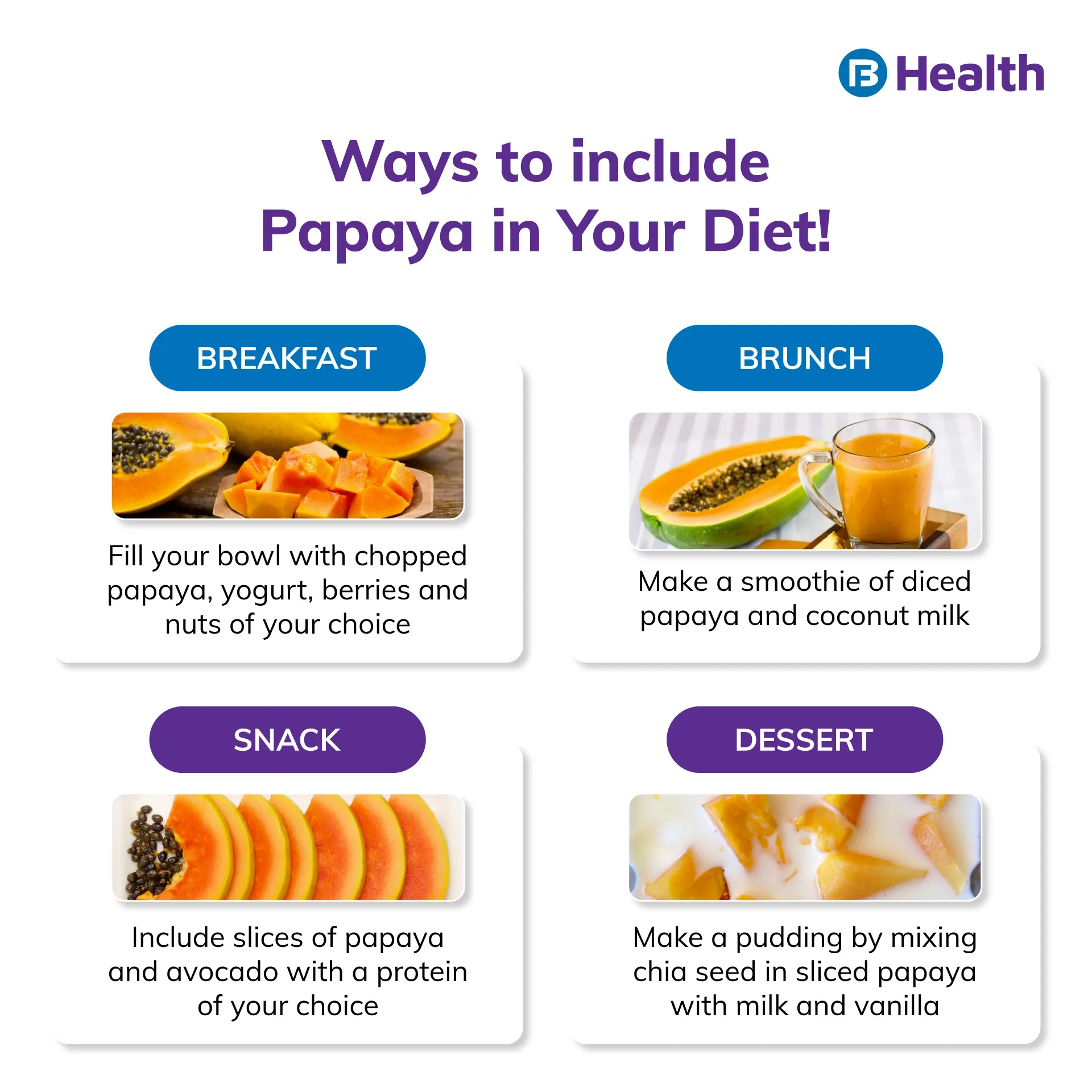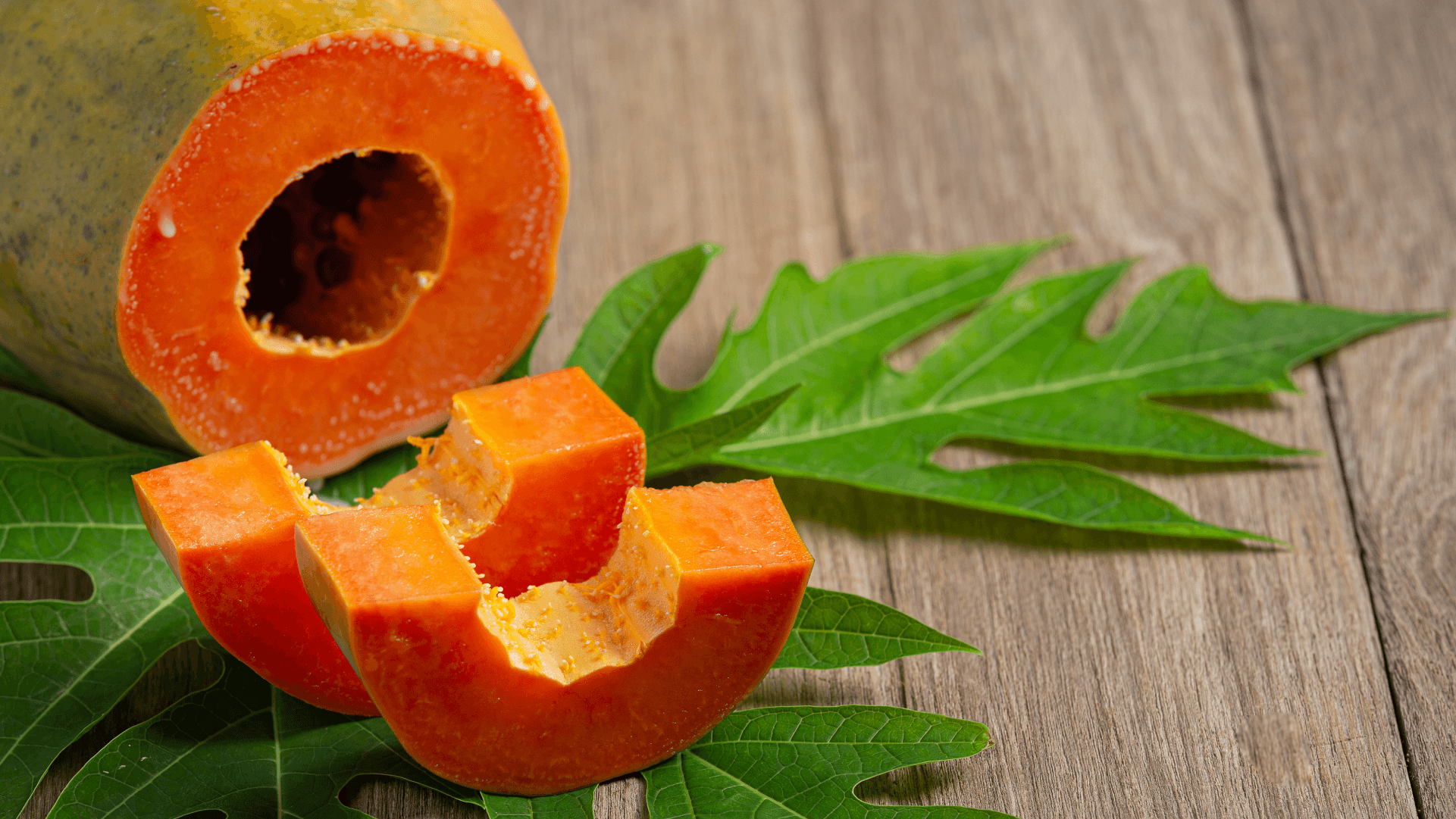Dietitian/Nutritionist | 7 min read
Papaya (Papita): Health Benefits, Recipes and Precautions
Medically reviewed by
Table of Content
Key Takeaways
- Papaya, despite being a seasonal fruit can be found and eaten all year long
- The nutritional value of papaya helps keep you healthy during winter season
- Papaya benefits range from raising body temperature to preventing asthma
Papaya is known for its nutritional value as well as its medicinal benefits. Papaya fruit, native to Mexico, is now grown in various countries and can be found all year round. The sweet and soft texture of this fruit is why there are many recipes with papaya as a key ingredient. These papaya recipes not only make your dish tastier but also help get the most of its nutrients.
The nutritional value of papaya makes it one of the best fruits to eat not only during winter but also all year long. Loaded with vitamins, minerals, and antioxidants, this fruit helps with various health conditions.
Nutritional Value of Papaya
The nutritional value of papaya is as follows:
- A 100 gm serving of papaya contains 32 calories
- 0.6g of protein
- 0.1g of fat
- 7.2g of carbs
- 2.6g of fiber
- Vitamins A, B, C, E, and K
Papaya also contains antioxidants to help the body winter Flammarion, diseases, and wrinkles.
12 Health Benefits of Papaya
Read on to know more about the benefits of papaya.
Increases Body Heat
During winter, as the temperatures around you drop, your body may start producing heat in its own way. Shivers, muscle contractions, and slower metabolism are some ways your body preserves its heat in winter. Having hot foods or foods that naturally increase your temperature may help your body fight the cold weather. Papaya also benefits you to increase body temperature.. Its consumption during winter may help in regulating your internal temperature.
Additional Read: Winter Season FruitsPrevents Asthma
One of the common triggers of asthma is cold weather. A study found that there were more asthma-related hospital admissions during winter [1]. This is because cold air is dry and it increases mucus, which may trigger your asthma. Eating papaya in winters is one of the best solutions to prevent asthma because the fruit is a rich source of beta carotene, a nutrient that provides immunity against asthma. Papaya also contains other nutrients that can help fight cold and flu.
Papaya Benefits for Skin
The cold weather and low humidity during winter draws the moisture from your skin, leaving it dry. The harsh winds and dry indoor heat may make the texture of your skin worse. This may even lead to cracked skin. Certain skin conditions may also get worse during winter. The fruit is rich in enzymes and vitamin A that help exfoliate your skin. Its antioxidant properties help eliminate dead skin cells. The vitamin C plays its part in building collagen and tissue binding. These properties of papaya also slow skin aging and help prevent wrinkles.
Improves Digestion
As mentioned, one of the ways your body regulates temperature in winter is by slowing down metabolism. This may lead to irregular digestion. The papain enzyme of papaya benefits you in improving digestion. It does so by regulating your bowel movements. It also helps clear your digestive tract by removing toxins. It is also a great fruit to relieve your stomach from bloating, constipation, and other problems.
Strengthens Bones
You may experience joint pain and stiffness during winter, as your body restricts blood flow in your body. This helps protect vital organs during cold season. The low temperature may also increase thickness of the fluids in your joints, which may lead to stiffness. Since papaya has ample vitamin C, it helps keep your bones healthy. Papaya also has vitamin K that can improve your improve bone health and calcium intake.
Boosts Immunity
When your body is exposed to the cold and dry air during winter, your immune system is affected. Cold weather may reduce your vitamin D intake. It may also contract the blood vessels in your respiratory tract. This makes it difficult for your body to fight off germs and infection. This weakened resistance makes flu and cold more common during winter [2].
The vitamin C content of papaya is double the recommended amount. This vitamin is essential for building immunity. Along with vitamin C, papaya also has papain, potassium, folate, and magnesium. These nutrients help build your immunity and fight off infections. Since you already know the importance of a balanced diet, make sure you include papaya in your plan to build better immunity.
Additional Read: Immunity Boosting Diet PlanReduces Cholesterol
Papaya contains lots of antioxidants and Vitamin C. While Vitamin C lower cholesterol level, antioxidants reduce the likelihood of block formation due to cholesterol. Blocks are the reason for heart attacks and strokes. Moreover, fibre-rich foods like papaya have components that reduce the overall level of LDL cholesterol, which is unhealthy.
Papaya for Weight Loss
Papaya helps you from gaining extra weight in three ways:
It has a low glycaemic index (GI), which means your blood sugar level won’t increase quickly, triggering the body to convert excess sugar into fat
Papaya helps in reducing food cravings being a fibrous food
Papaya has anti-dyslipidaemia properties that reduce the absorption of lipids
Safe for People Who Have Diabetes

Due to the low GI properties of papaya, it is safe to eat for patients who have diabetes. Your blood sugar level will not rise quickly, unlike high GI foods; this is because it takes the body a long time to convert low GI foods to sugar. Moreover, the antioxidants also help regulate the blood sugar level.
Helps with Eyesight
Papaya has Vitamin A; it helps prevent macular degeneration and improves eyesight. Another component found in papaya, Zeaxanthin, also prevents age-related macular degeneration. Zeaxanthin also filters out UV rays, preventing damage to retinal cells.
Reduces Stress
Another benefit of papaya is that it helps you control stress. Vitamins C and E present in the fruit regulate stress hormones. In addition, the antioxidants present in papaya also reduce the oxidative stress caused by inflammation.
Reduces Menstrual Pain
Papaya can help with pain in women during their periods. The papaya contains papain that will make blood smoothly pass from the uterus. Moreover, it contains carotene that regulates oestrogen; this increases the frequency of periods, minimizing pain.
Some Easy Must-try Papaya Recipes
Here are some delicious recipes using papaya:
Papaya Mango Smoothie:
- Add 150 ml of coconut milk, 250 g of papaya, 200 g of mango, a small banana, and a cup of Greek yoghurt in a blender. Blend the ingredients till you get a smooth fluid
- Freeze it for 15 minutes and add other solid fruits for flavour
Papaya Salsa
- Add 250 g rice papaya cut into cubes in a bowl with half a cup of avocado and red onion, two tablespoons of Cilantro & lemon juice, and a quarter teaspoon of pepper & salt
- Ensure you use fresh avocado and papaya, not frozen. Otherwise, you would get a watery salsa. The salsa remains edible for up to 24 hours
To follow healthy food habits, make sure you know the possible side effects that may come from overconsumption of any food. When you have too much of papaya, side effects that you may experience may include:
- Nausea
- Vomiting
- Diarrhea
- Allergic reaction
Papaya Ice Cream
- Blend 250 g of papaya in a blender along with 150 g frozen pineapple, 100 g coconut cream, 100 g dates, and one tablespoon of papaya extract
- Add dry fruits on the top and freeze it for around 15 minutes to get delicious creamy goodness
Health Cautions From Eating Papaya
Though papaya is nutritious food if consumed in moderation, overconsumption of papaya has some side effects. They are as follows:
- Papaya contains components that may damage the oesophagus if you consume it in excess
- The high latex content in unripe papaya may poison the foetus; hence, a pregnant woman should be cautious. Choose completely ripe papaya and do not consume it in excess
- Papaya may interact with anticlotting medicines; if you have such a condition or are on medication, then consult a doctor before eating papaya
- Overconsumption of papaya may make your stool loose
- Papaya seeds benefit you in reducing sperm motility
Though these side effects are rare, do not hesitate to talk to your doctor when you experience them. This will help you prevent these symptoms from becoming severe.
Also remember some common symptoms of a nutrition deficiency. These include
When you see signs of malnutrition, contact your nutritionist for effective treatment. You may also be given nutrition therapy based on your deficiency. You can book an online doctor consultation on Bajaj Finserv Health to talk to nutritionists. They can help you form a nutritious diet that is tailor-made for your health.
References
- https://journals.plos.org/plosone/article?id=10.1371/journal.pone.0102475
- https://www.hopkinsmedicine.org/health/conditions-and-diseases/winter-illness-guide
Disclaimer
Please note that this article is solely meant for informational purposes and Bajaj Finserv Health Limited (“BFHL”) does not shoulder any responsibility of the views/advice/information expressed/given by the writer/reviewer/originator. This article should not be considered as a substitute for any medical advice, diagnosis or treatment. Always consult with your trusted physician/qualified healthcare professional to evaluate your medical condition. The above article has been reviewed by a qualified doctor and BFHL is not responsible for any damages for any information or services provided by any third party.





